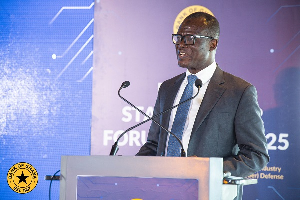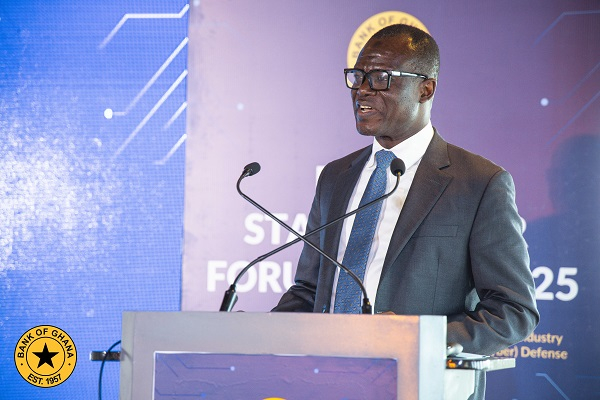 Dr Zakari Mumuni, First Deputy Governor of the Bank of Ghana
Dr Zakari Mumuni, First Deputy Governor of the Bank of Ghana
The Bank of Ghana has reaffirmed its commitment to strengthening cybersecurity across the country’s financial sector with the expansion of the Financial Industry Command Security Operations Centre (FICSOC), an initiative aimed at fortifying institutions against growing digital threats.
Delivering the welcome address at a stakeholder engagement forum held at the Bank Square, First Deputy Governor of the Bank of Ghana, Dr Zakari Mumuni, underscored the urgency of a united front to combat cyber risks, money laundering, and terrorist financing.
“The digital revolution has transformed our financial system, opening pathways to innovation, but also to vulnerability. Cyber risks are unlike any other and they are stealthy, adaptive, and borderless. A breach in one part of our ecosystem could compromise the entire network,” Dr Mumuni said.
Citing recent statistics, Dr Mumuni revealed that Ghana recorded nearly GH¢10 million in cyber and technology-related fraud in 2024, a rise from GH¢8.9 million in 2023.
Globally, he noted, financial cyberattacks surged by 38% in 2023 while money laundering flows topped $2 trillion.
As part of its ongoing efforts, the Bank of Ghana will revise its Cyber and Information Security Directive (CISD), first issued in 2018, to account for emerging risks such as artificial intelligence, data privacy, and cloud computing.
“We are not resting on our success story because cybersecurity is never static as it evolves, and so must we,” Dr Mumuni emphasised.
The FICSOC, launched following the 2018 directive, currently serves as a central monitoring hub, allowing banks and financial institutions to detect and respond to threats in real time. It has been credited with significantly improving situational awareness and fostering collaboration among stakeholders.
“Participating institutions can now monitor threats in real time, share incident reports promptly, and coordinate responses with greater speed and impact. Indeed, when we work together, we are stronger, smarter, and faster,” Dr Mumuni noted.
The Bank of Ghana has also been officially designated by the Cyber Security Authority as the Sectoral Computer Emergency Response Team (CERT) lead for the financial industry, a role that positions it at the heart of national cybersecurity efforts.
“This designation is not just a title, it is a responsibility that opens the door to cross-sectoral intelligence sharing and a unified national response,” Dr Mumuni.
To expand FICSOC’s reach, the Bank is now working with other financial regulators, including the National Insurance Commission (NIC), the National Pensions Regulatory Authority (NPRA), and the Securities and Exchange Commission (SEC), to bring all regulated financial institutions into the fold.
“Cybersecurity must be democratised and every institution must be supported with the tools and visibility to protect their operations and their customers,” he stated.
Dr Mumuni concluded with a call for continued collaboration, noting that the resilience of Ghana’s financial system hinges not just on regulation or technology, but on unity.
“Let us commit to a safer, more inclusive financial ecosystem, one where no institution’s resilience stands alone, and no one is left behind,” he said.
MA
Watch the latest edition of BizTech below:
Click here to follow the GhanaWeb Business WhatsApp channel
